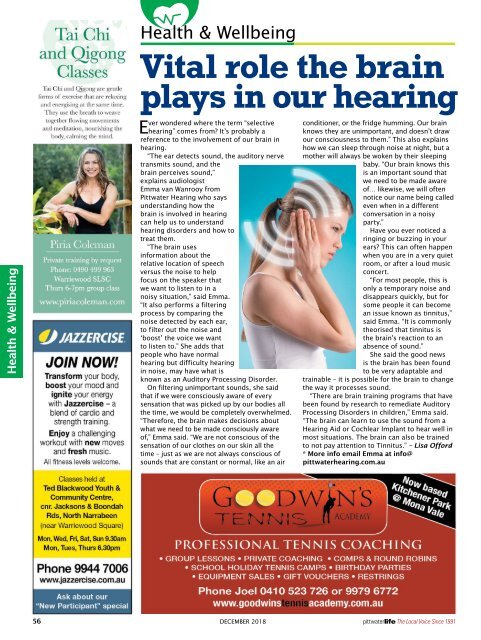Pittwater Life December 2018 Issue
WIN A $500 Gift Card! Pittwater Xmas Guide. Battle Of The Bends. It's Time To Talk Turkey!
WIN A $500 Gift Card! Pittwater Xmas Guide. Battle Of The Bends. It's Time To Talk Turkey!
You also want an ePaper? Increase the reach of your titles
YUMPU automatically turns print PDFs into web optimized ePapers that Google loves.
Health & Wellbeing<br />
Vital role the brain<br />
plays in our hearing<br />
Health & Wellbeing<br />
Ever wondered where the term “selective<br />
hearing” comes from? It’s probably a<br />
reference to the involvement of our brain in<br />
hearing.<br />
“The ear detects sound, the auditory nerve<br />
transmits sound, and the<br />
brain perceives sound,”<br />
explains audiologist<br />
Emma van Wanrooy from<br />
<strong>Pittwater</strong> Hearing who says<br />
understanding how the<br />
brain is involved in hearing<br />
can help us to understand<br />
hearing disorders and how to<br />
treat them.<br />
“The brain uses<br />
information about the<br />
relative location of speech<br />
versus the noise to help<br />
focus on the speaker that<br />
we want to listen to in a<br />
noisy situation,” said Emma.<br />
“It also performs a filtering<br />
process by comparing the<br />
noise detected by each ear,<br />
to filter out the noise and<br />
‘boost’ the voice we want<br />
to listen to.” She adds that<br />
people who have normal<br />
hearing but difficulty hearing<br />
in noise, may have what is<br />
known as an Auditory Processing Disorder.<br />
On filtering unimportant sounds, she said<br />
that if we were consciously aware of every<br />
sensation that was picked up by our bodies all<br />
the time, we would be completely overwhelmed.<br />
“Therefore, the brain makes decisions about<br />
what we need to be made consciously aware<br />
of,” Emma said. “We are not conscious of the<br />
sensation of our clothes on our skin all the<br />
time – just as we are not always conscious of<br />
sounds that are constant or normal, like an air<br />
conditioner, or the fridge humming. Our brain<br />
knows they are unimportant, and doesn’t draw<br />
our consciousness to them.” This also explains<br />
how we can sleep through noise at night, but a<br />
mother will always be woken by their sleeping<br />
baby. “Our brain knows this<br />
is an important sound that<br />
we need to be made aware<br />
of… likewise, we will often<br />
notice our name being called<br />
even when in a different<br />
conversation in a noisy<br />
party.”<br />
Have you ever noticed a<br />
ringing or buzzing in your<br />
ears? This can often happen<br />
when you are in a very quiet<br />
room, or after a loud music<br />
concert.<br />
“For most people, this is<br />
only a temporary noise and<br />
disappears quickly, but for<br />
some people it can become<br />
an issue known as tinnitus,”<br />
said Emma. “It is commonly<br />
theorised that tinnitus is<br />
the brain’s reaction to an<br />
absence of sound.”<br />
She said the good news<br />
is the brain has been found<br />
to be very adaptable and<br />
trainable – it is possible for the brain to change<br />
the way it processes sound.<br />
“There are brain training programs that have<br />
been found by research to remediate Auditory<br />
Processing Disorders in children,” Emma said.<br />
“The brain can learn to use the sound from a<br />
Hearing Aid or Cochlear Implant to hear well in<br />
most situations. The brain can also be trained<br />
to not pay attention to Tinnitus.” – Lisa Offord<br />
* More info email Emma at info@<br />
pittwaterhearing.com.au<br />
56 DECEMBER <strong>2018</strong><br />
The Local Voice Since 1991

















